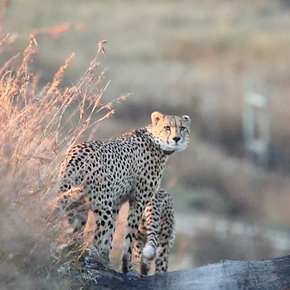
Southeast African Cheetah,
Nambiti Game Reserve, South Africa

African Buffalo,
Nambiti Game Reserve, South Africa

Flamingo Tongue Snail,
Middle Caye, Belize
Animal Experience
Animal experience is a must-have component of one's background before they are accepted to veterinary school, and it is easy to see why. I can say with full confidence that the involvement I've had over the past couple of years has had a significant impact on determining the qualities I need to cultivate in order to become the best veterinarian I can be.
I started working with animals when I was thirteen, on a horse ranch that specialized in hippotherapy. I found the site as my mother was a patient of theirs, and I was able to see first hand the sheer importance of connection between animals and humans. This is absolutely when I started to become passionate about educating the community on animal welfare, and why I began committing myself to the long years ahead to become a veterinarian. I took care of the horses, but also led some children with disabilities through certain exercises to strengthen their cognitive and motor functions. I learned so much during this time about animal husbandry and how much good animals can bring, and these lessons would become
invaluable further down the road.
My next animal experience came with volunteering at the Chelonian Research Institute, a turtle and tortoise sanctuary that provided me with a unique opportunity to interact with a range of species and learn about their care and rehabilitation. It was incredibly fun to do this, and I talked about it so often that I am still known to this day as the turtle girl to some. I had to handle and feed these animals (Galápagos Tortoises love hibiscus flowers!), clean their enclosures, and had the opportunity to observe their behavior and health. This experience further developed my skills in animal handling, husbandry, and observation.
I had the amazing opportunity to do some volunteer work and project management at the Nambiti Game Reserve in South Africa. This provided me so much exposure to different ecosystems and the challenges that animals face in the wild. I participated in conservation efforts, including tracking animals and furthering research in order to better understand their behavior and how to protect them. This experience would have taught me much about the importance of conservation and the interplay between wildlife and human populations, especially for endangered and/or often poached species.
I also worked at the Veterinary Emergency Clinic of Central Florida for two years. This provided me with a more clinical setting to develop the skills I need to become a veterinarian. I observed surgeries, explained medications, triaged all patients that came through the door, and learned how to effectively communicate with clients, especially those that were extremely worried about their animal. This experience exposed me to a wide range of medical cases and emergencies, allowing me to develop my knowledge and skills in recognizing
symptoms and prioritizing criticality.
These experiences have given me a broad understanding of the different roles and responsibilities of a veterinarian, from animal welfare and conservation to clinical practice. They helped me develop critical skills, such as animal handling, observation, communication, and medical knowledge, which are essential for success in the field I work in. I am incredibly excited to see where my next opportunity takes me on the road to veterinary school.

Galápagos Tortoise,
Chelonian Research Institute

Caribbean Spiny Lobster,
Glover's Reef, Belize

Winning Golden Retriever,
St. Cloud, Florida